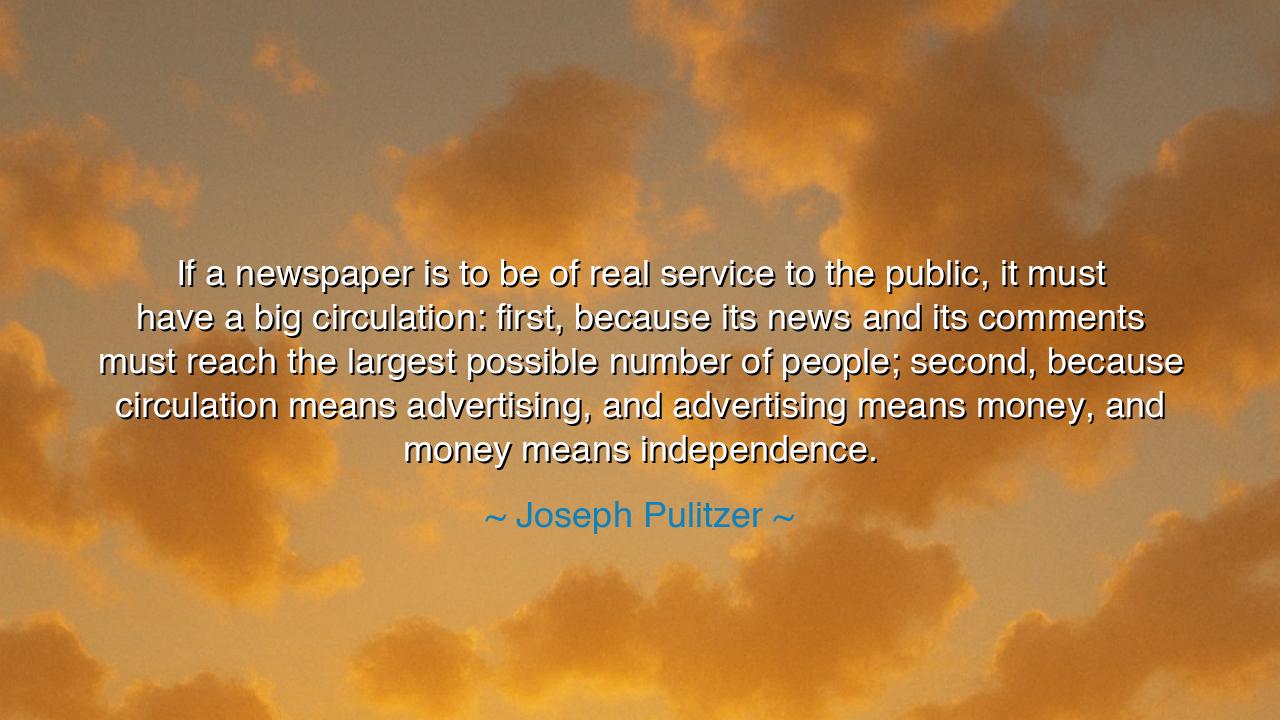
If a newspaper is to be of real service to the public, it must
If a newspaper is to be of real service to the public, it must have a big circulation: first, because its news and its comments must reach the largest possible number of people; second, because circulation means advertising, and advertising means money, and money means independence.






The words of Joseph Pulitzer, a titan of journalism and champion of truth, rise like a solemn creed for all who bear the burden of informing the world. When he said, “If a newspaper is to be of real service to the public, it must have a big circulation: first, because its news and its comments must reach the largest possible number of people; second, because circulation means advertising, and advertising means money, and money means independence,” he spoke not only as a publisher, but as a philosopher of democracy. His insight reveals the eternal struggle between truth and power—the need for those who speak truth to be strong enough to resist those who would silence it. For Pulitzer, the pen could only remain free when sustained by the means to stand alone.
To understand the origin of this truth, one must look to the life of the man himself. Joseph Pulitzer, born in Hungary in 1847, arrived in America as an impoverished immigrant, armed only with determination and intellect. Through perseverance, he rose to become one of the most influential figures in American journalism, founding the New York World and shaping modern reporting itself. He lived in an age of fierce competition, corruption, and rapid industrialization—an era when newspapers were both weapons and shields, capable of toppling governments or deceiving entire nations. He understood that the newspaper was not merely a business—it was a public trust. Yet, to uphold that trust, it needed strength, and in the world of men, strength was measured in resources.
Pulitzer’s declaration reveals a profound paradox: that money, often the corrupter of truth, can also be its protector—if it flows from independence, not servitude. He saw that a newspaper which relied on charity or government favor could never speak freely, for its survival would depend on pleasing its patrons. But one that commanded wide circulation, supported by its readers and advertisers, could stand upright and unbending, beholden to no one but the truth. “Money means independence,” he said—not as a celebration of wealth, but as a recognition that freedom without means is a fragile illusion. In this, Pulitzer spoke not only for journalists, but for all who labor in the service of justice: ideals must be anchored by strength, or they will be swept away by the tides of power.
The lesson of his wisdom was proven in his own time. When Pulitzer’s newspaper exposed corruption in the building of the Panama Canal, he was sued by the government and vilified by the powerful. Yet he refused to yield. He believed that the people’s right to know was sacred, and his independence—secured through the success of his paper—gave him the courage to defy even the mighty. In the end, he prevailed, and his victory set a precedent that protected freedom of the press for generations to come. His words remind us that truth must be defended not only with conviction, but with the means to survive attack.
There is an older echo of this principle in history. In the days of ancient Athens, the philosopher Socrates stood before his judges, accused of corrupting the youth with his questioning of authority. He had no wealth, no position, no power—only his words. And though his ideas endured, his life was taken. In contrast, those who came after him—Plato, Aristotle—built schools, gathered patrons, and preserved his legacy through the strength of organization and support. Their wisdom survived because it was sustained. So too with journalism, or any cause of truth: noble ideals perish in silence unless they find the means to speak loudly and long. Circulation, as Pulitzer understood, was not vanity—it was the voice of democracy amplified.
In the tone of the ancients, we may say: truth must be both pure and powerful. A righteous voice that cannot reach the ears of the people is like a flame hidden beneath stone—it burns, but it does not illuminate. A newspaper, like a philosopher or prophet, must walk the path between integrity and survival. It must never sell its soul for gold, but neither must it starve into silence. For what good is virtue if it cannot endure? Pulitzer’s wisdom lies in this balance: that independence is not a gift of fortune, but a structure built upon the will of the people who support it. When readers value truth enough to sustain it, freedom flourishes.
The lesson, then, extends beyond journalism—it speaks to every human endeavor that seeks to serve rather than to dominate. Independence is the root of all integrity. Whether in art, in science, in politics, or in personal life, one must learn to build strength not through servitude, but through purpose and self-sufficiency. Dependence on flattery or patronage corrodes the soul; but the courage to stand by one’s convictions, sustained by honest work, keeps one free.
Thus, the practical path is this: seek always to align your means with your mission. Let your livelihood never contradict your truth. Support institutions that serve the public good, that speak with honesty even when it costs them dearly. As Joseph Pulitzer teaches, liberty does not live on ideals alone—it must be fed by strength, sustained by labor, and protected by the will of those who believe in it. For only when the press, and by extension the people, are both independent and informed, can the light of democracy continue to shine—bright, unbought, and undying.






AAdministratorAdministrator
Welcome, honored guests. Please leave a comment, we will respond soon